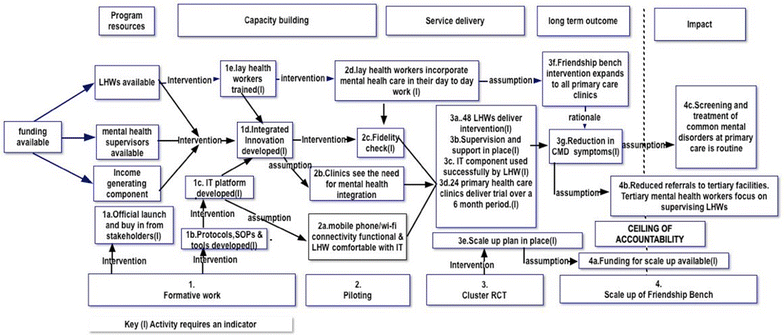Using a theory driven approach to develop and evaluate a complex mental health intervention: the friendship bench project in Zimbabwe
- PMID: 26933448
- PMCID: PMC4772526
- DOI: 10.1186/s13033-016-0050-1
Using a theory driven approach to develop and evaluate a complex mental health intervention: the friendship bench project in Zimbabwe
Abstract
Background: There is a paucity of data on how to deliver complex interventions that seek to reduce the treatment gap for mental disorders, particularly in sub-Saharan Africa. The need for well-documented protocols which clearly describe the development and the scale-up of programs and interventions is necessary if such interventions are to be replicated elsewhere. This article describes the use of a theory of change (ToC) model to develop a brief psychological intervention for common mental disorders and its' evaluation through a cluster randomized controlled trial in Zimbabwe.
Methods: A total of eight ToC workshops were held with a range of stakeholders over a 6-month period with a focus on four key components of the program: formative work, piloting, evaluation and scale-up. A ToC map was developed as part of the process with defined causal pathways leading to the desired impact. Interventions, indicators, assumptions and rationale for each point along the causal pathway were considered.
Results: Political buy-in from stakeholders together with key resources, which included human, facility/infrastructure, communication and supervision were identified as critical needs using the ToC approach. Ten (10) key interventions with specific indicators, assumptions and rationale formed part of the final ToC map, which graphically illustrated the causal pathway leading to the development of a psychological intervention and the successful implementation of a cluster randomized controlled trial.
Conclusion: ToC workshops can enhance stakeholder engagement through an iterative process leading to a shared vision that can improve outcomes of complex mental health interventions particularly where scaling up of the intervention is desired.
Keywords: Complex intervention; Mental health; Stakeholder involvement; Theory of change.
Figures
References
-
- Lund C, Tomlinson M, De Silva M, Fekadu A, Shidhaye R, Jordans M, Petersen I, Bhana A, Kigozi F, Prince M, et al. PRIME: a programme to reduce the treatment gap for mental disorders in five low- and middle-income countries. PLoS Med. 2012;9(12):e1001359. doi: 10.1371/journal.pmed.1001359. - DOI - PMC - PubMed
LinkOut - more resources
Full Text Sources
Other Literature Sources
Miscellaneous


